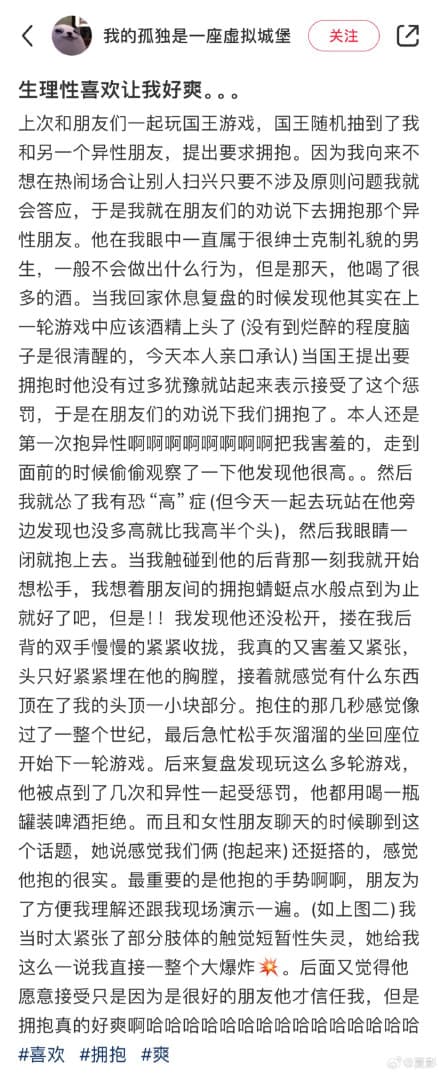Viral Weibo Thread Explores the Nuances of 'Physiological Liking' in a Drinking Game
A Viral Moment of Embracing Strangers in a Popular Drinking Game Reveals Surprising Emotions

22 February 2024
A recent Weibo thread went viral as netizens shared their own experiences and interpretations of "physiological liking" after a user described an emotional and physical encounter during a game of King's Cup. The story has sparked a debate on the nuances of human attraction and the role that physiological responses play in our emotions.
It all began when a Weibo user shared their experience of being chosen by the "King" in a game of King's Cup, a popular drinking game in China. The "King" can pick two players, usually of the opposite sex, and assign them an embarrassing or intimate task. In this instance, the task was to hug each other.
The user initially agreed to the task because they did not want to cause a scene or embarrass their friends. They described their counterpart as a reserved and polite man who rarely made any moves. However, on that night, the person had consumed a considerable amount of alcohol and agreed to the "punishment" without hesitation. The intimate encounter left the user feeling both nervous and fascinated.
As the embrace continued, they felt the other person's arms tighten around their waist, and their head pressed against the other person's chest. The brief moment seemed to stretch into an eternity. Later, the user discovered that their partner had consistently refused similar "punishments" involving physical intimacy, but had agreed in this instance because he trusted the user as a friend.
The story has garnered a lot of attention on Weibo, with netizens sharing their own interpretations and experiences of "physiological liking." Some described feeling a genuine connection with a stranger during intimate moments, while others expressed confusion or even discomfort.
One user commented, "It's interesting how we can feel so connected to someone we barely know through a simple touch or embrace. It feels like our bodies are communicating on a deeper level than our minds."
Another user shared their own experience of feeling a strong physiological attraction towards someone based solely on their physical appearance. They explained that from a psychological perspective, this type of attraction is real and intense, driven by underlying genetic factors.
However, not everyone agreed with the idea of "physiological liking." Some users argued that these feelings can be misunderstood or misinterpreted, leading to awkward or even dangerous situations. One user pointed out that a stranger's touch or embrace in a crowded place, like a bus, might not be appreciated or desired by everyone, even if it was well-intentioned.
Despite the controversy, the story has shed light on the complex and often conflicting emotions that arise during moments of physical intimacy, whether between friends or strangers. It raises questions about the relationship between our bodies and minds, and the role that physiological responses play in shaping our emotions.
As the debate continues to unfold, one thing is clear: the concept of "physiological liking" has struck a chord with many Weibo users, and it is likely to remain a topic of discussion for some time to come.
The story is a timely reminder of the power of human connection and the importance of understanding and respecting each other's boundaries. As we navigate the complexities of modern relationships and social norms, it is essential to remain open-minded and empathetic towards the experiences and feelings of others.
In summary, the viral Weibo thread has sparked a thought-provoking conversation about the nuances of human attraction and the role that physiological responses play in our emotions. While some users find the concept of "physiological liking" intriguing and relatable, others are more cautious and wary of its potential consequences. Regardless of one's stance, the story serves as a reminder of the importance of empathy and respect in all of our interactions.




